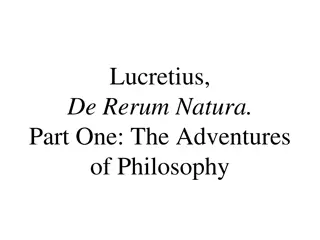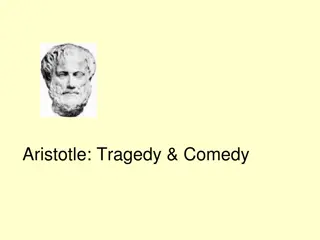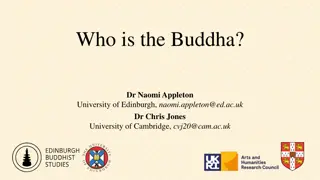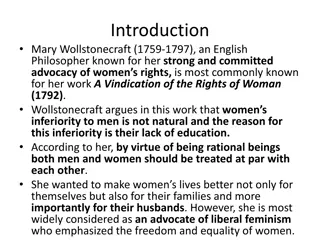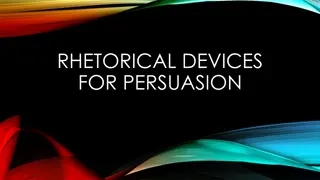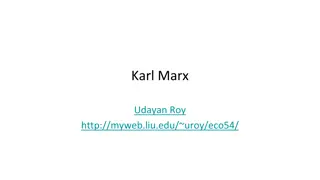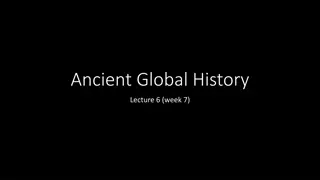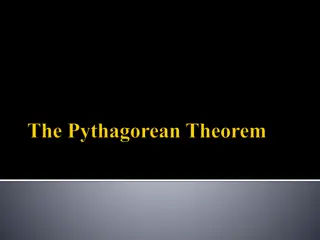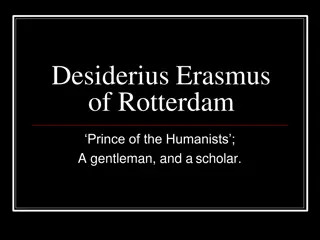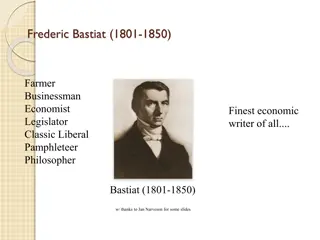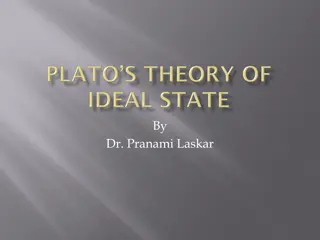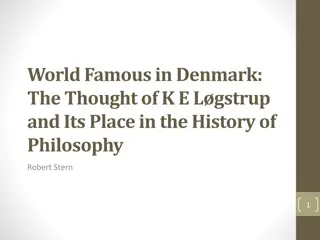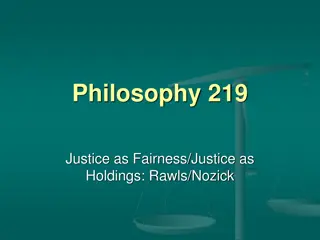Exploring Lucretius and De Rerum Natura: Philosophy, Poetry, and Materialism
Delve into the life and works of Roman philosopher and poet Lucretius, particularly his masterpiece "De Rerum Natura." Discover the blend of philosophy and poetry, the essence of atomistic materialism, and the themes of explanation, free will, and mortality explored in his writings.
3 views • 24 slides
Aristotle's The Poetics: Tragedy and Comedy Analysis
Aristotle, the Greek philosopher, introduced key concepts in his work The Poetics, focusing on tragedy and comedy. He countered Plato's views on literature and emphasized the importance of imitation, catharsis, and the unity of time, place, and action in dramatic composition.
0 views • 32 slides
Exploring the Buddha: Historical Figure, Philosopher, and Social Reformer
Dive into the multifaceted exploration of the Buddha as a historical figure, philosopher, and social reformer in a series of sessions led by experts from the University of Edinburgh and University of Cambridge. Discover the significance of the Buddha in Buddhist practice, his portrayal in modern Bri
0 views • 11 slides
Stories of Honesty and Wisdom from History
Discover tales of honesty and wisdom in historical settings through rearranging sentences to create coherent stories. Explore the accounts of an honest tax collector appointed by a Sultan and the intellectual journey of the renowned philosopher Aristotle under the mentorship of Plato.
0 views • 20 slides
Women's Rights Advocacy in Historical Perspective
Mary Wollstonecraft, an English philosopher known for her advocacy of women's rights, particularly in her work "A Vindication of the Rights of Woman," challenged the notion of women's inferiority and lack of education. Her ideas laid the foundation for liberal feminism and influenced feminist moveme
0 views • 21 slides
Mary Wollstonecraft: British Feminist Writer and Philosopher
Mary Wollstonecraft (1759-1797) was an influential British writer and feminist known for her work, "A Vindication of the Rights of Woman." Her life was marked by controversial relationships and she married philosopher William Godwin. Despite her untimely death at 38, Wollstonecraft's advocacy for wo
0 views • 14 slides
Exploring Jean Jacques Rousseau's Political Philosophy
Jean-Jacques Rousseau, an influential political philosopher, was born in 1712 in Geneva, known for his works that inspired the French Revolution. His diverse talents ranged from writing to music composition. Rousseau's writings, including "The Social Contract" and "Emile," address themes of politica
0 views • 21 slides
Jeremy Bentham and Utilitarianism: A Vision for Social Reform
Jeremy Bentham, a prominent philosopher of the 18th and 19th centuries, advocated for utilitarianism, which states that the greatest happiness of the greatest number should be the measure of right and wrong. He proposed the concept of the Panopticon as a new mode of obtaining power over individuals.
2 views • 13 slides
Mastering Rhetorical Devices for Persuasion
Understand the art of rhetoric and the power of persuasion through ethos, pathos, and logos. Explore how writers use varying techniques like formal word choice, emotional appeal, and allusion to sway audiences. Delve into the persuasive appeals of ethos, pathos, and logos as explained by Greek philo
0 views • 12 slides
Understanding John Locke's Philosophy on Knowledge and Innate Ideas
John Locke, a prominent philosopher, delved into the concept of knowledge, emphasizing certainty and instructiveness. He defined knowledge as perceiving connections or disparities of ideas, distinguishing between innate ideas and those acquired externally. Locke believed innate ideas were not univer
0 views • 8 slides
Karl Marx: The Revolutionary Thinker and Philosopher
Explore the life and theories of Karl Marx, a prominent figure in political philosophy and economics. Discover his works such as "Capital" and "The Communist Manifesto," as well as his theory of history and dialectical materialism. Learn about the impact of technology and power on the mode of produc
0 views • 42 slides
The Life and Contributions of Plato: A Historical Overview
Plato, a Classical Greek philosopher and mathematician, played a significant role in shaping Western philosophy and science. Born around 427 B.C. in Athens, he was influenced by his mentor Socrates and later founded the Academy in Athens. Plato's works such as "The Republic" and "The Laws" are renow
0 views • 45 slides
The Axial Age: Pivotal Thinkers Across Ancient Civilizations
The Axial Age, coined by Karl Jaspers, refers to a period from the 8th to 3rd century BCE where pivotal thinkers emerged independently in Persia, India, China, Greece, and Rome, shaping the spiritual foundations of humanity. Jaspers, a German philosopher and psychiatrist, highlighted the importance
2 views • 21 slides
Exploring the Pythagorean Theorem and Its Origins
The Pythagorean Theorem, named after the ancient Greek mathematician Pythagoras, is a fundamental principle in geometry relating to right triangles. While Pythagoras is credited with offering a proof of the theorem, evidence suggests that earlier civilizations like the Babylonians and ancient Chines
0 views • 21 slides
Chinese Philosopher Smackdown: Deep Dive into Philosophical Quotes
Explore a riveting discussion on various philosophical quotes with insightful interpretations and connections made by participants. Delve into the essence of government, society, power, wisdom, responsibility, and more through thought-provoking reflections on renowned philosophical statements.
2 views • 14 slides
The Wisdom and Humor of Nasreddin Hodja: A Legendary Folk Philosopher
Nasreddin Hodja, born in 1208, was a folk philosopher known for his wisdom and humor. His teachings reflect his unique worldview, offering insights through anecdotes that tackle extremism and everyday life events. Stories of Nasreddin Hodja have spread worldwide, emphasizing the depth and meaning be
0 views • 7 slides
René Descartes: Philosopher and Mathematician Extraordinaire
René Descartes, known as the Father of Modern Philosophy, made significant contributions to both philosophy and mathematics. Born in 1596 in France, Descartes received a Jesuit education and later worked as a Corps of Engineers applying mathematics to practical applications. His philosophical works
0 views • 15 slides
Life and Legacy of Desiderius Erasmus of Rotterdam
Desiderius Erasmus, a Dutch philosopher and scholar, was a pivotal figure in the humanist movement of the Renaissance. Born in Rotterdam in 1460, Erasmus advocated for unrestricted learning, church reform, and intellectual independence. His works, such as "In Praise of Folly," left a lasting impact
0 views • 7 slides
Jeremy Bentham and Utilitarianism
Jeremy Bentham, a late 18th-century British philosopher, introduced Utilitarianism, a moral philosophy focused on maximizing happiness and minimizing pain. He believed that all actions are motivated by pleasure and pain, and that the principle of utility judges actions based on their impact on happi
0 views • 17 slides
Al-Farabi: Influential Medieval Philosopher and His Ideal City Concept
Al-Farabi, influenced by Plato and Aristotle, was known as the Second Aristotle. His works spanned various fields like logic, math, medicine, music, politics, and ethics. He proposed a philosophy involving God as a beginning, being in the middle, and happiness as the end. Al-Farabi delved into the c
0 views • 5 slides
Understanding Affirmative Action: Origins and Criticisms
Affirmative Action was first proposed in the US by President John F. Kennedy in 1961 to combat discrimination. It aimed to prevent discrimination based on race, color, religion, sex, and national origin. This policy evolved into two forms: Strong Affirmative Action, which involves preferential treat
0 views • 39 slides
Aristotle's Ethical Philosophy and the Concept of Eudaimonia
Aristotle, a renowned ancient philosopher, introduced the concept of eudaimonia in his Nicomachean Ethics. Eudaimonia, often translated as flourishing, signifies the ultimate human good achieved through fulfilling one's unique function well. Aristotle's ethical framework emphasizes the pursuit of vi
0 views • 22 slides
Insights from Frederic Bastiat on Law, Liberty, and Plunder
Frederic Bastiat, an eminent economist and philosopher, delves into the topic of law, its purpose, and the misuse of power in society. He critiques how laws can be perverted to serve individual greed and false philanthropy, leading to legal plunder. Bastiat emphasizes the importance of protecting ri
0 views • 23 slides
Mevlana Exchange Programme - Bridging Cultures through Education
Mevlana Exchange Programme facilitates the exchange of students and academic staff between Turkish and international higher education institutions, promoting cultural understanding and academic collaboration. Named after the renowned philosopher Mevlana Rumi, this program transcends geographical bou
0 views • 18 slides
Discovering Techniques for Detecting Deadlock Bugs in Concurrent Programs
This analysis delves into various bug detection techniques for concurrent programs, focusing on deadlock bugs. It explores model checking and testing techniques, discussing their precision, error detection capabilities, and scalability challenges. The prevalence of deadlock bugs in real-world applic
0 views • 35 slides
Exploring Wittgenstein's Revolutionary Ideas on Language and Philosophy
Ludwig Wittgenstein, a brilliant 20th-century philosopher, challenged fundamental concepts in psychology, education, and medicine. His unique perspective on language, logic, and thought encourages us to question assumptions and play with language. Wittgenstein's quotes inspire us to rethink understa
0 views • 13 slides
Insights into the Enlightenment Thinkers: Philosophers of Change
The Enlightenment era marked a shift towards reason and enlightenment, with thinkers like Locke, Hobbes, Montesquieu, Rousseau, and Voltaire advocating for progress, natural law, and individual rights. Each philosopher contributed unique ideas to reshape societal structures, challenging traditional
0 views • 18 slides
Exploring the Essence of Socratic Seminars in Education
Delve into the world of Socratic Seminars led by Lisa Laker, an English Teacher at Franklin Central High School. Discover the profound impact of Socrates, the eminent philosopher, and learn about the core elements and benefits of engaging in Socratic Seminars in educational settings. Uncover the sig
0 views • 26 slides
Exploring the Enigmatic World of Cthulhu: Descriptions, Attraction, and Hyperobjects
Delve into the mysterious realm of Cthulhu through descriptions of its unfathomable form, the allure it holds over certain individuals, and its classification as a hyperobject by philosopher Timothy Morton. Discover the eerie and unsettling sensations evoked by encounters with Cthulhu and the profou
0 views • 8 slides
Comprehensive Guide to Writing a Philosopher Research Term Paper
In this detailed term paper guide, learn how to write a 4-6 page paper on a philosopher's life and work. Covering biography, philosophical contributions, and citation styles such as MLA, APA, or Chicago Manual. Get step-by-step instructions on structuring your paper, including sections on introducti
0 views • 18 slides
Insights into the Socrates Educational Initiative of the European Commission
The Socrates Project was an educational initiative by the European Commission involving 31 countries. It aimed to enhance the European dimension of education, language knowledge, cooperation, mobility, innovation, and opportunities. Named after the philosopher Socrates, the program operated from 199
0 views • 7 slides
Friedrich Nietzsche - Philosopher and Thinker Extraordinaire
Friedrich Nietzsche, a renowned German philosopher, cultural critic, and essayist, challenged traditional Western morality and Christian beliefs. He advocated for personal reflection in philosophy, rejected societal norms, and introduced existentialist ideas that emphasized individual freedom and re
0 views • 10 slides
Philosophy of Plato: The Ideal State and Its Principles
Plato's Republic presents the concept of the ideal state governed by a philosopher king, with distinct classes and systems of communism in property and family. The state emphasizes functional specialization, justice, and totalitarian control but faces criticisms for lacking individual freedom, retai
0 views • 5 slides
Sir Francis Bacon: A Prominent Figure in Writing Prose
Sir Francis Bacon (1561-1626) was a prominent figure known for his distinctive writing style during the Elizabethan and Jacobean Ages. His Essays, first published in 1597 and expanded in 1625, cover a wide range of philosophical, political, moral, and social topics. Bacon's legacy as a scientist, ph
0 views • 5 slides
Biography of Francis Bacon: English Philosopher and Statesman
Francis Bacon, also known as Lord Verulam, was a prominent English philosopher and statesman who significantly contributed to the development of the scientific method. Born in 1561 to a notable family, Bacon's early education and legal career laid the foundation for his influential role in English p
0 views • 12 slides
Insights from Confucius: Wisdom and Philosophy
Explore the life and teachings of Confucius, a renowned sage and philosopher known for his emphasis on education, virtue, and self-reflection. Uncover the significance of Confucius ceremonies and his enduring legacy in history. Delve into timeless quotes that reflect his profound wisdom and principl
0 views • 16 slides
John Stuart Mill: Philosopher of Liberty and Utilitarianism
John Stuart Mill (1806-1873) was a prominent British philosopher known for his contributions to the principles of liberty and utilitarianism. He advocated for individual freedom and emphasized the importance of self-protection as the justification for societal interference. His work "On Liberty" exp
0 views • 10 slides
Insights into Seneca the Younger and His Philosophical Tragedies
Explore the life and works of Seneca the Younger, a prominent Roman philosopher, and playwright. Delve into his tragedies, such as Thyestes, and contemplate the intersection of politics, philosophy, and allegory in his works. Witness the challenging of Stoic principles and the portrayal of character
0 views • 13 slides
Løgstrup: A Closer Look at the World-Famous Danish Philosopher
Løgstrup, a renowned philosopher from Denmark, is well-respected in his homeland but relatively unknown outside Scandinavia. This article delves into his life, influences, works, and the key concept of the ethical demand, which he explores in a non-religious context. It raises questions about the e
0 views • 33 slides
Rawls' Theory of Justice: Balancing Liberty and Equality
John Rawls, a prominent American philosopher, introduced his theory of justice in his influential book "A Theory of Justice." He emphasized the importance of distributive justice and rational choices in shaping fair social arrangements. Rawls believed in a principle where rational agents would selec
0 views • 16 slides
